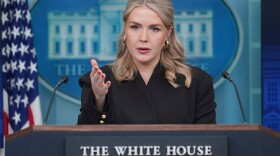AILSA CHANG, HOST:
OK, now let's bring in NPR's national political correspondent Mara Liasson. Hey, Mara.
MARA LIASSON, BYLINE: Hi there.
CHANG: So you've also read the resignation letter Mattis released. What about it stood out to you?
LIASSON: Well, the thing that really stood out to me was that he's not retiring as the president tweeted that he was. He's resigning over principle. He's quitting. He's saying, I can no longer serve you because our differences are too profound. So this is the first major resignation in the Trump administration over policy and principle. Rex Tillerson was fired. Other people have been forced out. But Jim Mattis stood down because he could no longer agree and support the policies. That's really what stood out to me.
CHANG: So the first departure based on principle perhaps but one of many departures - where does this leave the president's foreign policy team?
LIASSON: I think the president's foreign policy more and more is about the president and his gut. He's a party of one. He's deciding things on his own. The pullout from Syria was done with very little consultation. It blindsided a lot of officials. I think that we used to talk about jokingly the Committee to Save America, this group of people - McMaster, Mattis, Tillerson, Kelly - that...
CHANG: Right.
LIASSON: ...Somehow or other, they had a - some leverage over the president. If they disagreed what he was doing in foreign policy, they'd all threatened to resign en masse. Well, that conventional wisdom was just wrong. He's gotten rid of one after the other of them one by one. I think it tells you that John Bolton, the national security adviser, is ascendant. And we really don't have a major voice in the administration who believes that America's alliances are part of American national security, whether it's an alliance with the Kurds, the Afghan government, South Korea, NATO. We don't have that voice.
CHANG: You mention Kelly, him being the other high-profile departure from the Trump administration in less than two weeks. This is his former chief of staff. What does this tell us about the way the West Wing is working right now?
LIASSON: Well, I think the West Wing is working according to the president's instincts. And he likes to be. - he's a one-man show. He's a one-man band. He likes to decide things. He doesn't really want to have a chief of staff in the traditional sense. He doesn't want to really be managed. And he made the decision to pull out from Syria against the advice - well, he didn't really get much advice - but against the wishes of his - almost his entire national security team.
CHANG: Remember the day when the president seemed so happy to be surrounding himself with...
LIASSON: Oh, he used to say, my generals.
CHANG: ...All these generals, (laughter) right.
LIASSON: He used to call them, my generals.
CHANG: Right. Now, I know it's very early to be asking this, but do you have any idea who Trump might be looking at for a replacement?
LIASSON: No, I don't. But I can tell you what names have been mentioned - the great mentioner...
CHANG: Yeah.
LIASSON: ...In Washington - Lindsey Graham, who has become...
CHANG: Senator from South Carolina.
LIASSON: ...A strong ally of the president in some respects but very critical about the Syria pullout; Tom Cotton, senator from Arkansas, a hawk with presidential ambitions. That would make the cabinet a really competitive place with Mike Pompeo as secretary of state. And we've heard about General - former General Petraeus, who I guess wants to get back in the game; Mac Thornberry, the chairman of the House Armed Services Committee - or outgoing chairman of the House Armed Services Committee. So there are definitely people...
CHANG: All right.
LIASSON: ...Who would do the job. The president has to decide who he wants.
CHANG: OK, that's NPR's Mara Liasson at the White House. Thanks, Mara.
LIASSON: Thank you. Transcript provided by NPR, Copyright NPR.








